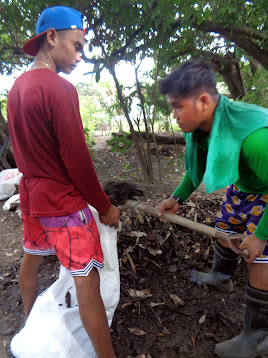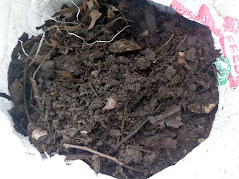Pul-oy (Breeze)
San Vicente Ilocos Sur RP to the World Series
Practical Composting
Dr Abe V Rotor
"Composting is Nature's recycling, organic to inorganic matter,
breaking compounds back into elements, for the use of the new set of living things." - avr
Converting dead parts of living things like leaves, into soil is the key to composting. All you have to do is help Nature do the process. Don't interfere by burning, or throwing them as waste. Rather, provide the necessary conditions. Take the case of composting mango leaves as shown in these photos.
Rake the leaves into a pile under the trees, and keep the file damp. The rainy season favors composting. This is pile composting, in situ, which keeps the nutrients in place. Do not ever build fire on the pile. Meantime, prepare a pit nearby. Dump the undecomposed leaves after harvesting the mature compost pile. Continually replace the pile every time you rake the surroundings. Your pit compost will soon be ready for harvesting. See photos.
Composting is a continuous process. Include other compostable materials like stems, fruits, weeds, stalks, but never plastics and glass. Composting continues in the sacks. Partially decomposed leaves will soon catch up in time. Avoid exposing harvested compost to direct sunlight. Don't allow compost to dry up in the sacks. Use soonest you can. Ideal compost has the typical earth smell. Foul odor and signs of heat mean the compost is not mature, or done by installment. There is a saying, "garbage in, garbage out." Composting is an art, it is a virtue to convert potential waste into a valuable product - more so, in helping Mother Nature keep the environment clean, healthy and balance. This is a key to sustainability, which in the long term is called homeostasis. ~
Compost is cheap and can be made at home from farm and home wastes, as compared to chemical fertilizer which is expensive, and a poor farmer can barely afford it. Compost is environment friendly. Chemical fertilizer on the other hand, is harmful to the environment. It pollutes waterways and increases acidity in soil which is harmful to most crops. Compost harbors beneficial soil organisms like nitrogen-fixing bacteria, and earthworm. On the contrary, chemical fertilizer, which is often used with chemical pesticide, destroys these organisms. ~
Practical Composting helps in reducing pollution and global warming, and their attendant ill-consequences. It is also a personal and collective means in contributing to food production, and keeping our environment balance, healthy and clean.






No comments:
Post a Comment